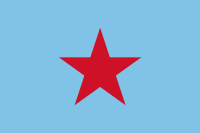Yemeni Socialist Party
| Yemeni Socialist Party | |
|---|---|
| الحزب الاشتراكي اليمني | |
 | |
| General Secretary | Abdulraham Al-Saqqaf |
| Founders | Abdul Fattah Ismail, Ali Nasser Muhammad, Ali Salim al-Beidh |
| Founded | 1978 |
| Preceded by | National Liberation Front |
| Headquarters | Aden, Yemen |
| Ideology |
1978-1990: Marxism-Leninism Communism 1990-present: Arab socialism Democratic socialism |
| Political position |
Left-wing Far-left (formerly) |
| International affiliation |
Progressive Alliance, Socialist International |
| Colours | Red |
| House of Representatives |
8 / 301 |
| Party flag | |
 | |
| Website | |
|
www | |
|
Politics of Yemen Political parties Elections | |
The Yemeni Socialist Party (YSP) (الحزب الاشتراكي اليمني, Al-Hizb Al-Ishtiraki Al-Yamani) is a political party in Yemen. It was the ruling party in South Yemen before unification in 1990. Now it is a democratic socialist opposition party in the unified Yemen.[1][2]
General secretaries
- Abdul Fattah Ismail (1978–1980)
- Ali Nasser Muhammad (1980–1986)
- Ali Salim al-Beidh (1986–1994)
- Ali Saleh Obad (Moqbel) (1994–2005)
- Dr. Yasin Said Numan (2005–2015)
- Abdulraham Al-Saqqaf (2015–present)
History
In Yemen, radical and progressive ideas appeared in the 1940s and 1950s with the first waves of Yemeni students abroad. Political organizations in this Muslim country emerged and evolved to become governing parties.[3]
The YSP evolved through several stages of struggle to liberate, unify and transform the Yemeni society. Its inauguration in 1978 by Abdul Fattah Ismail, its first leader, came as a result of the progressive unification process of a number of Yemeni revolutionary groups in both South and North Yemen, including the Unified Political National Front Organization, itself the result of merging three parties, namely the National Front for the Liberation of Occupied South Yemen (NLF), Democratic Popular Union Party (Marxist), and Popular Vanguard Party of South Yemen (left Ba'ath Party); and the Yemeni Popular Unity Party in North Yemen, itself the result of merging of 5 leftist organizations, namely: Revolutionary Democratic Party of Yemen, Popular Vanguard Party in North Yemen, Organisation of Yemeni Revolutionary Resistors, Popular Democratic Union and Labour Party.[4]
In power, the YSP was beset by internal divisions. Abdul Fattah Ismail was replaced as President of South Yemen by Ali Nasser Muhammad in 1980. Ali Nasser was a more moderate and conciliatory leader in comparison with the pro-Soviet leftism of Abdul Fattah Ismail, and sought to improve relations with South Yemen's Arab neighbours and the West. Conflict between the two factions led to the South Yemen Civil War in 1986 which led to the death of Abdul Fattah Ismail, although his ally Ali Salim al-Beidh took his control while the more moderate Haidar Abu Bakr al-Attas became president. Al-Beidh and al-Attas would occupy positions in the government of a reunified Yemen until the 1994 civil war.
Surviving many upheavals and civil strife in Yemen, the collapse of the Soviet Union, and the crisis of international socialism, the YSP was instrumental in achieving Yemeni unity and the establishment of multi-party democracy in the Republic of Yemen in May 1990.[5]
Subsequent to the 1994 civil war the party's infrastructure and resources were confiscated by the GPC government and its cadres and members are regularly subjected to unwarranted arrests and torture. As a result, at the last legislative elections in 2003 the party only won 3.8% of the popular vote and eight out of 301 seats in the House of Deputies, the Parliament.[6]
Current situation
The main strands constituting the composite ideology of the YSP are pan-Arab nationalism, Marxism, and social democratic trends. Since its inception the YSP has evolved through 7 distinct stages. Currently, the YSP along with other parties in the opposition coalition, including Islah Party are waging a peaceful struggle for free and fair elections, peaceful transfer of power, and reformation of the Yemeni political system.[7]
See also
- South Yemen Movement
References
- ↑ Clark, Victoria. Yemen: Dancing on the Heads of Snakes. N.p.: Yale University Press, 2010. Print.
- ↑ Yemeni Socialist Party. "Political Program of Yemeni Socilist Party." Sahafa Net. Yemeni Socialist Party, 21 July 2010. Web. 18 Mar. 2013.<http://www.sahafah.net/show766377.html>.
- ↑ National Information Center. "Basic information about Political Parties/ Basic information Yemeni Socialist Party." National Information Center (Yemen). Presidential Office of the Republic, 2010. Web. 19 Mar. 2013. <http://www.yemen-nic.info/sectors/politics/detail.php?ID=8437>.
- ↑ Ahmed, Mohammed Ghaleb. "Letter from Politburo member Mohammed Ghaleb Ahmed to 26th September Newspaper on achievements of 30th November 1967." 26 September Net. 26 September Newspaper/National Information Secretariat, 29 Nov. 2012. Web. 19 Mar. 2013. <http://www.26sept.info/newspaper/2012/november/1671/5706-4/36573---------l26r--1967-------.html>.
- ↑ Clark,Victoria. Yemen: Dancing on the Heads of Snakes. N.p.: Yale University Press, 2010. Print.
- ↑ Hashed net. "The Yemeni Socialist Party Issues its first Statement." New-Yemen. newyemen.net, 3 July 2012. Web. 20 Mar. 2013. <http://www.newyemen.net/dgNews/news-8537.htm>.
- ↑ Mareb Press. "The Houthis claim several parties are not committing to conditions." Mareb Press. Mareb Media foundation, 16 Feb. 2013. Web. 21 Mar. 2013. <http://marebpress.net/news_details.php?lng=arabic&sid=52216>.
| ||||||||||